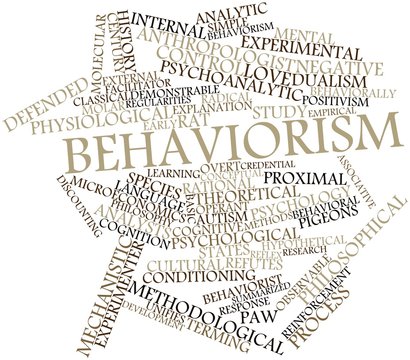Behaviorism is a fundamental school of thought in psychology that emphasizes the study of observable behaviors and the environmental factors that shape them. This approach to psychology suggests that behavior can be explained and understood without delving into internal mental processes.
In this article, we will explore the core principles, key concepts, and applications of behaviorism psychology.
Core Principles of
Behaviorism
1. Observable Behavior
Behaviorism focuses on
studying behaviors that are observable and measurable. It avoids speculation
about internal mental processes and instead emphasizes the importance of
empirical observation.
2. Environmental
Influence
Behaviorists contend that
behavior is primarily shaped by environmental factors. These factors include
rewards, punishments, stimuli, and the learning experiences an individual
encounters throughout their life.
3. Learning Through
Conditioning
Behaviorism places a
significant emphasis on the role of learning through conditioning, where
associations are formed between stimuli and responses. Two primary forms of
conditioning are classical conditioning (Pavlovian conditioning) and operant
conditioning (Skinnerian conditioning).
Key Concepts in
Behaviorism
1. Classical Conditioning
Classical conditioning,
pioneered by Ivan Pavlov, explores how associations between stimuli and
responses are formed. For example, when a neutral stimulus (e.g., a bell) is
repeatedly paired with an unconditioned stimulus (e.g., food), the neutral
stimulus becomes a conditioned stimulus, eliciting a conditioned response
(e.g., salivation).
2. Operant Conditioning
Operant conditioning,
developed by B.F. Skinner, focuses on how behaviors are influenced by
consequences. Behaviors that are followed by rewards (reinforcement) are more
likely to be repeated, while those followed by punishments are less likely to
be repeated.
3. Behavior Modification
Behavior modification, a
practical application of behaviorism, involves using principles of
reinforcement and punishment to change and shape behavior. It is commonly used
in various settings, including education, therapy, and parenting.
Applications in
Psychology and Education
1. Behavior Therapy
Behavior therapy is a
psychological treatment approach that draws heavily from behaviorism. It is
used to treat a wide range of psychological disorders, including anxiety
disorders, phobias, and obsessive-compulsive disorder, by modifying maladaptive
behaviors.
2. Education and
Classroom Management
Behaviorism principles are
applied in education to manage and shape student behavior. Techniques such as
positive reinforcement, token economies, and behavior charts are used to
encourage desired behaviors and discourage undesired ones in classroom settings.
3. Behavioral Assessment
Behavioral assessment
involves systematic observation and measurement of behavior to identify and
understand behavioral issues. It is used in clinical settings, schools, and
organizational psychology to assess and address behavioral problems.
Criticisms and
Limitations
Behaviorism has faced
criticism for its narrow focus on observable behaviors while neglecting
cognitive processes and internal mental states. Critics argue that it
oversimplifies the complexity of human behavior and ignores the role of
thoughts, emotions, and individual differences.
Conclusion
Behaviorism psychology
offers valuable insights into the study and understanding of behavior. By
emphasizing observable behaviors and the environmental influences that shape them,
behaviorism has had a significant impact on fields such as therapy, education,
and behavioral analysis. While it may not provide a complete picture of human
cognition and emotion, behaviorism remains a foundational and practical
approach in psychology.


Post a Comment